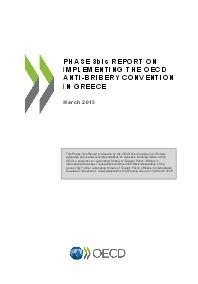Organisation for Economic Co-operation and Development (OECD) PHASE 3bis Report on Implementing the OECD Anti-Bribery Convention in Greece, Μάρτιος 2015.
EXECUTIVE SUMMARY
The Phase 3bis Report on Greece by the OECD Working Group on Bribery evaluates and makes recommendations to Greece on its implementation of the Convention on Combating Bribery of Foreign Public Officials in International Business Transactions and related instruments. The Report results from the Working Group’s exceptional decision in 2012 to conduct a supplemental Phase 3bis evaluation of Greece. It examines issues that the Working Group was unable to fully assess in the previous Phase3 evaluation in 2012. The report also examines Greece’s implementation of the Working Group’s 38 Phase3 recommendations that were made in 2012, and new developments in Greece that time. Since 2012, Greece has significantly enhanced some aspects of its implementation of the Convention but there remains ample room for improvement in others.
Greece has made efforts to tackle domestic corruption in the country, but it needs to give much higher priority to fighting foreign bribery. Greece does not fully appreciate that its companies are at substantial risk of committing foreign bribery. The National Anti-Corruption Action Plan and other government policies continue to only address “corruption” generally which is interpreted as referring only to domestic corruption. This sends an unfortunate message that fighting domestic corruption is a priority during an economic crisis, but foreign bribery is an acceptable means to win overseas business and improve Greece’s economy. Greece must therefore urgently raise the priority of fighting foreign bribery and explicitly address foreign bribery in its national anti-corruption strategies. Awareness-raising efforts must specifically address foreign bribery and especially target the export, shipping and SME sectors.
There are also concerns about enforcement and detection. Greece has seven on-going foreign bribery investigations, which is a welcome development. However, one case was closed without a thorough investigation. Investigations initially were not opened into several other allegations despite investigations or convictions in foreign jurisdictions against foreign officials for receiving bribes from Greek nationals. Most of the allegations that led to investigations were provided by the Working Group and were not detected by the Greek authorities. The Working Group therefore recommends that Greece urgently raise the priority given to fighting foreign bribery, and take all necessary measures to assess and investigate allegations seriously and without delay. Sufficient resources and training must be provided to prosecutorial and investigative authorities, as questions remain over Greece’s capacity to handle complex economic and corruption cases. Greece must develop and implement a strategy to proactively detect foreign bribery cases that draws on diverse sources of information. It should analyse why its embassies have not forwarded foreign bribery allegations to prosecutors. Whistleblowers in the private sector should be better protected.
Greece has made progress in other areas. The Working Group welcomes Greece’s recent efforts to rationalize and reduce duplicate legislative provisions. The new foreign bribery offence clarifies some uncertainties identified earlier by the Working Group. The maximum fines for foreign bribery have been raised though further increases are necessary. The PPACC has been given an important role in investigations and prosecutions. Greece has clarified how foreign bribery investigators can obtain information protected by tax secrecy. The Working Group will follow up whether and how a new Ministry of Anti-Corruption impacts Greece’s fight against foreign bribery.
The report and its recommendations reflect findings of experts from Ireland and Republic of Korea and were adopted by the Working Group on 13 March 2015. The report is based on legislation and other materials provided by Greece, and research conducted by the evaluation team. It is also based on information obtained by the evaluation team during its on-site visit to Athens on 4-6 November 2014, during which the team met with representatives of Greece’s public and private sectors, judiciary, civil society, and media. Within one year of the Working Group’s approval of this report, Greece report orally to the Working Group on its implementation of certain recommendations. It will submit a written report on its foreign bribery enforcement actions and the implementation of all recommendations within two years.
Σχετικές αναρτήσεις:
- Dimitri Β. Papadimitriou (2015) “Greek Debt: Do the Right Thing“, The World Post US, 18 Μαρτίου.
- European Commission, (2014), “EU Anti-Corruption Report”, COM (2014) 38 final.
- Transparency International, (2013), “Corruption Perceptions Index 2013”, Transparency International, Δεκέμβριος.




